On July 29, 2020, the government of India paved the way to transform the Indian Education System, which has been looking for change since 1986. With the help of this New National Education Policy 2023, the government envisions the entire education system as per the current requirement, keeping Indian ethos. This नई शिक्षा नीति ensures that the current generation will get high-quality education so that they can build India a new Global Knowledge Superpower. Since the announcement of New Education Policy 2023, we have been asked only one question, i.e.,
What is the New NEP Policy 2020? So here in this article, we have answered all your queries in a simpler form.
New National Education Policy 2024
The new National Education Policy is primarily based on four pillars: Access, Equity, Quality, and Accountability. It possesses a new structure, i.e. 5+3+3+4, comprising 12 years of school and three years of Anganwadi/ pre-school, replacing the old 10+2 system. All states and UTs now start implementing the NEP 2023 in their education system, unlike Karnataka which is looking to bring its own Education Policy and scrap the NEP 2023 implemented in 2021.
New National Educational Policy 2024
Through this new education scheme, they are trying to bring more than two crore students into the mainstream and with the help of this, they aim to achieve 100% GER (Gross enrollment ratio) from preschool to secondary by the end of 2030. This NEP 2023, the government is looking forward to making India a “global knowledge superpower”, and it will be only done by making the education system for schools and colleges more flexible, holistic, and multi-disciplinary, bringing out their unique capabilities.
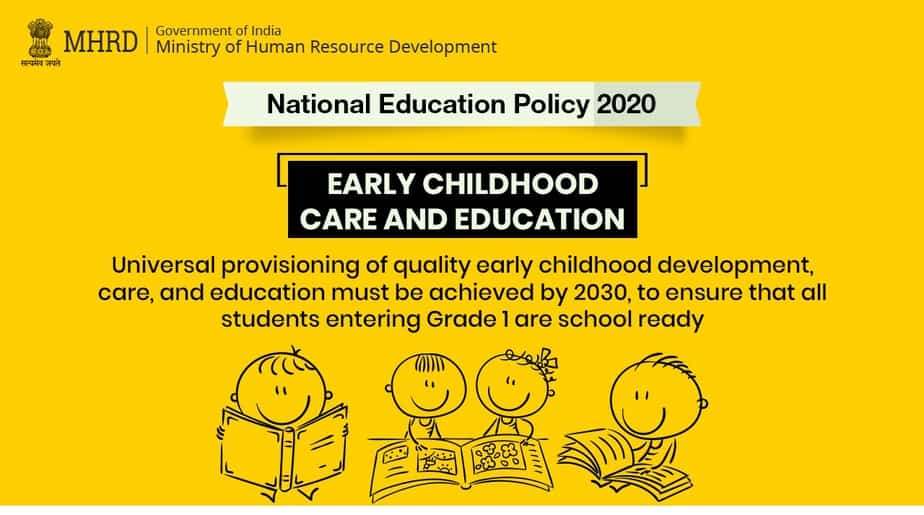
Major Reform in National Education Policy (नई शिक्षा नीति कब से लागू होगी
- Students now take a school examination conducted by the appropriate authority in grades 3, 5, and 8.
- Board examinations for 10th and 12 will be continued but redesigned with the aim of holistic development.
- PARAKH (Performance assessment, review, and analysis of knowledge for holistic development), a new national assessment platform, will be set up.
- Mathematical thinking and scientific temper coding will start in class 6
- Vocational education will begin in school from 6th grade, including internships.
- The 10+2 structure will be replaced by 5+3+3+4…
- The new system will have 12 years of schooling and 3 years of preschool/Anganwadi
- Till grade 5th, this policy will emphasize local language/regional language/mother tongue as the medium of instruction.
- At school and higher education, Sanskrit will also be included at all levels as an option for students, providing three language formulas.
- Literature on India and other classical languages will also be available.
- No student would be forced to learn any Language.
- Higher education will receive flexibility in subjects.
- There will be multiple entries and exit points with appropriate certification for higher education.
- UG program can be 3 or 4 years with multiple exit options with appropriate certification in this period. A certificate will be awarded after one year, an advanced diploma after two years, a degree after three, and a bachelor with research after four years.
- Academic Bank of Credit (ABC) will be created in which digital academic credit students earn will be stored through different HEIs and transferred and counted for the final degree.
- The curriculum in all subjects has been reduced to its core essentials.
- Through this, they focus on critical thinking, discovery, inquiry, discussion, and teaching based on analysis and holistic learning methods for education.
- A tight regulation for higher education.
- Focus on E-learning so that they can reduce their dependency on textbook.
- Under the new policy, education will get 6% of GDP. Earlier, it was 1.7%, which will boost the education system.
- By the end of 2040, they aim that all HEIs will become multidisciplinary institutions, each with 3000 or more students.
- In the next 15 years, college affiliation will be phased out.
- At least one oversized multidisciplinary HEI should be built in or near every district by 2030.
- Aim to achieve 100% youth and adult literacy.
- NTA will offer a common entrance exam for admission to HEIs
What is India’s Vision for 2047? Read here
#NEP2023 Fact: Do you know this was the 3rd NEP policy? The first policy came in 1968, and the 2nd one came in 1986, later amended in 1992.
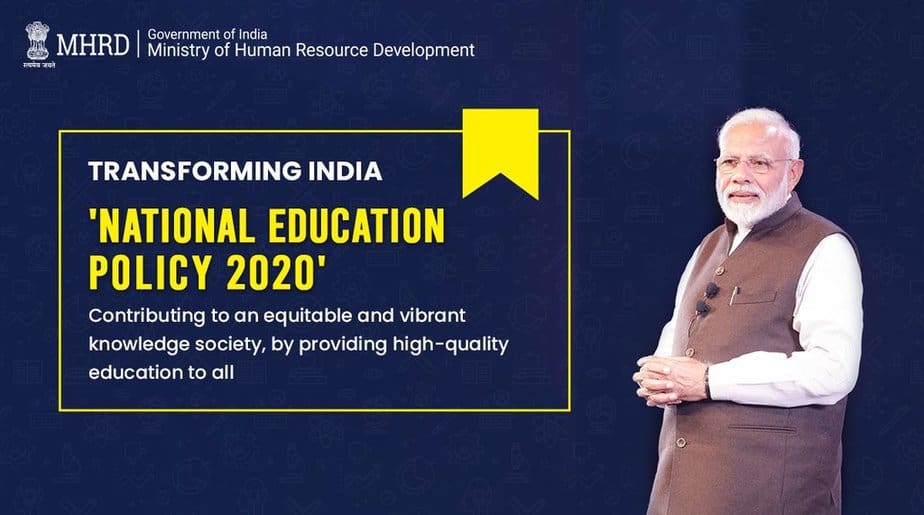
What is the vision of the New National Education Policy?
“The NEP 2023 envisions an India Centred education system that directly contributes to the evolution of our nation enduring into an equitable and vibrant knowledge society by giving them a top-class quality of education.”
Through this NEP, our country’s education system and research facility will become more robust and with the help of this, students who spent thousands of dollars on education in foreign countries will get global standards in line with India.
How to use Digilocker? Check here
NEP 2020
ECCE (Early Childhood Care and Education) Foundation of Learning:
Through this policy, children aged 3 to 6 years will have access to free, safe, high-quality, developmentally appropriate care and education by 2025. There is a severe learning crisis in India because children are enrolled for pre-primary but fail to attain basic skills.
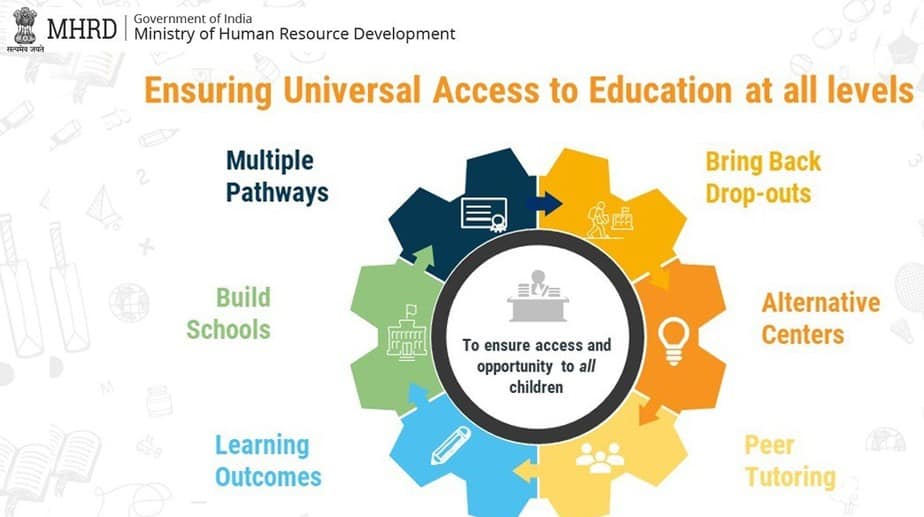
New Curriculum Structure
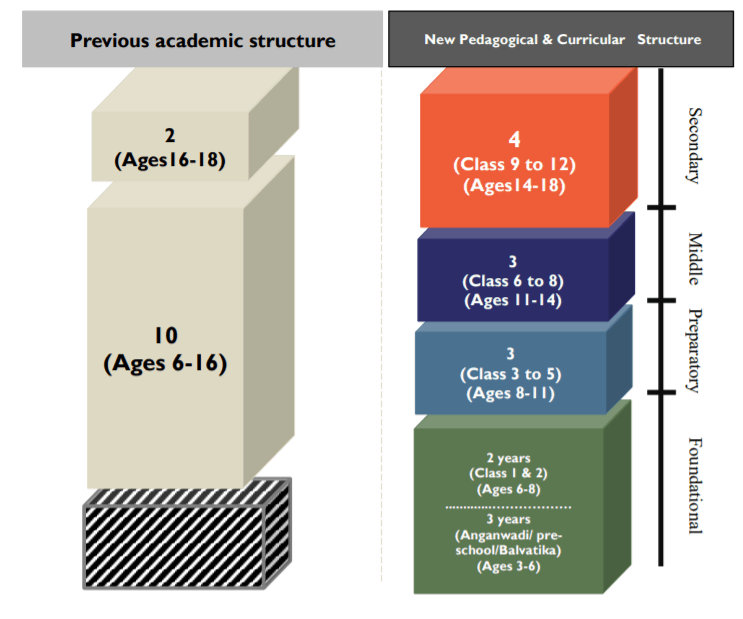
- Restructuring of the school curriculum and pedagogy to the new 5+3+3+4 pattern
- The new curricular structure was designed in the interest of learners at different stages of their development, such as 3 to 8, 8 to 11, 11 to 14, and 14 to 18 years.
- The Foundation stage will be of 5 years: 3 years of pre-primary and grades 1 and 2
- The preparatory stage will be of 3 years: Grades 3, 4, and 5
- The middle or upper primary will be of 3 years: Grades 6, 7, and 8
- High or secondary stage will be 4 years: Grades 9, 10, 11, and 12
- All stages mentioned above will incorporate Indian and regional traditions, ethical reasoning, socio-emotional learning, quantitative and logical reasoning, digital literacy, computational thinking, scientific tamper, languages, and communication skills.
Recommended | Calculate your Child’s Age Here
Education in Mother Tongue/Regional Language
As we know, young children grasp new things quickly when we speak in their language instead of some other language which they are not used to, and this policy also recognizes the same; thus, they added a point in this new policy that children up to grade 5 will be taught in their mother language, but it can also refer to grade 8 if required.
- For this, textbooks will also be made available in their language. Still, if it is not possible to provide, the language of interaction between teacher and students will be their home language.
- From grade 1 onwards, young children will get exposure to two to three languages, which may increase their speaking proficiency, interaction, and ability to recognize the same by grade 3.
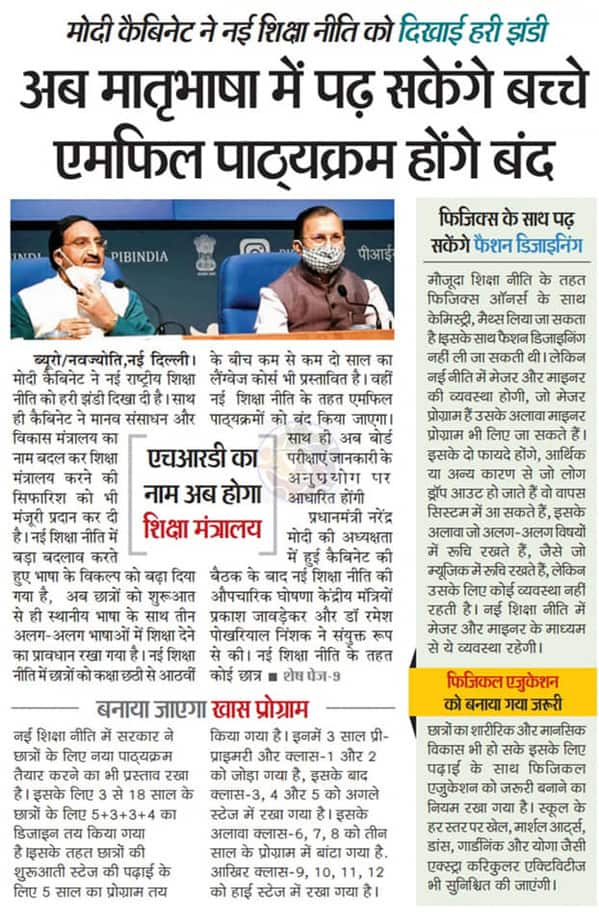
How will teachers be Recruited under NEP 2020?
Under the new National Education Policy, if there is a shortage of teachers who speak a given language, special efforts will be made, and the scheme will be rolled out to recruit teachers, including retired teachers who can speak the local language required.
Elective Foreign Language
Under New Education Policy 2023, in secondary school, children can opt for the foreign language of their choice, French, German, Spanish, Chinese, or Japanese, and this will only be an elective and not in place of the three-language formula.
Read here | How to apply for a Student APAAR ID Card?
Higher Education Under New National Education Policy
- Higher education plays an important role in improving human well-being and developing India. Through this NEP, they aim to increase their GER from 26.3% to 50% by 2035, and around 3.5 cr new seats will also be added to higher education institutions.
- Under this, UG education could be 3 or 4 years with a number of entry and exit options.
- Multidisciplinary education and Research University will be set up with global standards.
- HECI (Higher Education Commission of India) will be the only body for all higher education (except medical and legal education)
- HECI will have four independent verticals: NHERC (National Higher Education Regulatory Council) for the directive, GEC (Genera Education Council) for standard setting, HEGC (Higher Education Grants Council) for sponsoring, and NAC (National Accredition Council) for recognition.
- Globalization of higher education.
- An academic bank of credit will be established in which credit earned by the students during their academics from different HEIs could be stored and transferred at the time final degree.
- The National Research Foundation will act as a peak body that fosters a strong research culture and builds research capacity covering higher education.
College Affiliation Under NEP 2024
The affiliation of colleges will be phased out in 15 years, and a mechanism will be established for granting graded autonomy to colleges. And after some time, it is presumed that every college will develop into a self-governing degree provider or an intermediary of a university.
नई राष्ट्रीय शिक्षा नीति 2023 हिंदी में पढ़ने के लिए यहां क्लिक करें
Focus on Vocational Studies at the School Level
In 12th five year plan from 2012-2017, it is estimated that not more than 5% of Indians from the age group of 19 to 24 have received formal vocational education, which is too low if we compare it to other countries like the USA 52%, Germany 75%, and South Korea 96%. That’s why under this policy, every child from grades 6 to 8 must learn at least one vocational or more
- The importance of basic knowledge of various livelihood and life skills such as gardening, woodwork, pottery, electric work, and others
- They aim that by the end of 2025, they have at least 50% of learners from school and higher education who get exposure to vocational education.
B.Ed. Will be of 4 years
Under this new and inclusive national curriculum framework for teacher education, which will be formulated by NCTE with the help of NCERT, by the end of 2030, the minimum qualification for teachers will be a 4-year B.Ed. Degree program. For stand-alone teacher education institutes with inadequate standards, strict action will be taken against them.
Students Financial Aid
The National Scholarship Portal (NSP) will be expanded to support and encourage children, and their progress will be tracked so that they can receive scholarships. Private HEIs will be encouraged so that they can offer several studentships and fellowships to their children.
No rigid separation of streams under NEP 2023
Every student will get the opportunity to engage in arts and humanities as well as in the study of arts and science and social science; because of this no rigid separation going to be made between ‘curricular’ and ‘extra-curricular activities’ or ‘co-curricular activities.
- Every school subject will be considered as curricular rather than extra or co-curricular, including yoga, sports, dance, music, sculpting, woodworking, gardening, and electric work.
- NCERT will prepare syllabi and textbooks as per the NCF (national curriculum framework) so that these subjects can be incorporated into the curriculum. States SCERTs (State Councils of Educational Research Training) may edit, rewrite, and supplement as needed.
- Physical education will be incorporated strongly throughout their curriculum with a consideration of what is interesting and safe at each age.
- Also, there is no hard separation between the ‘vocational’ and ‘academic’ streams because they wanted every student will get an equal opportunity to develop both capabilities.
Read NEP official MHRD Official PDF- Click Here
नई शिक्षा नीति में हिंदी
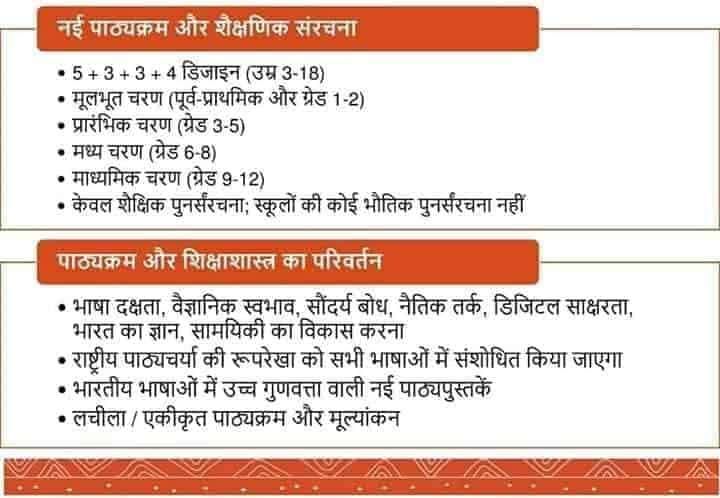
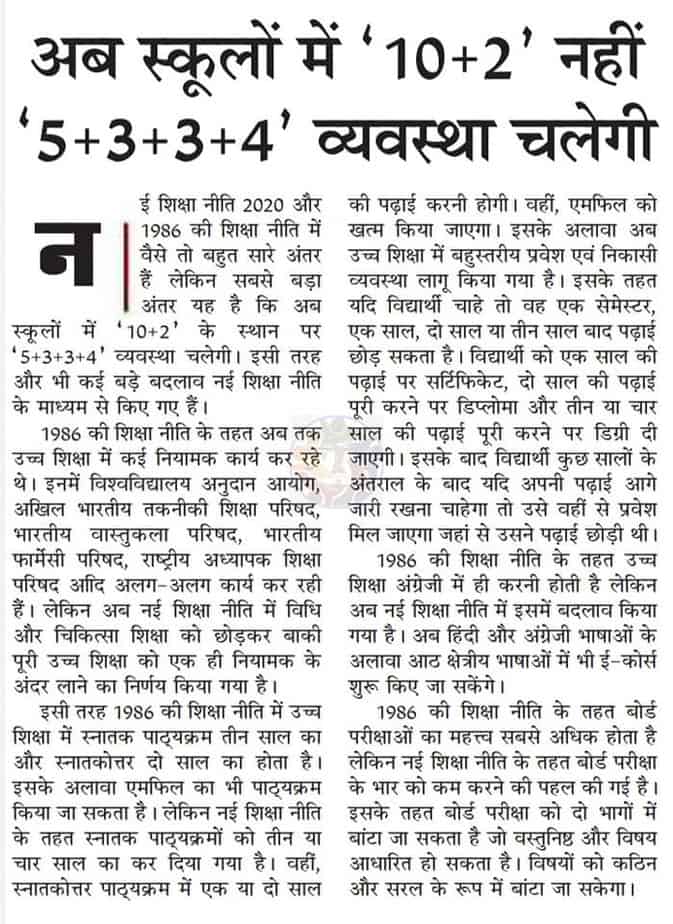
FAQs
Under whose chairmanship new national education policy was drafted?
It was done under the chairmanship of the former chairman of ISRO and ex-member of parliament K. Kasturirangan.
Term HEIs stand for what?
Higher Education Institution
A new national assessment centre has been set up named PARAKH; what does it stand for?
PARAKH stands for Performance Assessment, Review, and Analysis of Knowledge for Holistic Development.
When will the new National Education policy be implemented?
The implementation program of NEP is under preparation and it will be carried out as per the timeline envisaged in NEP.
Where can one collect complete details about NEP?
We have mentioned everything about NEP in this article. However, still, if you want to know more about it, then its complete information is available in the public domain, which the Education Ministry of India has carried out.
When will the NEP be implemented across the country?
There are some states that have implemented the NEP policy in their curriculum, like Uttarakhand, Uttar Pradesh, Assam and others. But its implementation will be done in Phases.








I am very much excited.A nation can truly develop only on its own language & culture 👍
Your education should be free from religion of any kind. Let Sanskrit be one language of learning without any preference or compulsion.
I am curious about the policy for kids on spectrum, kids with special needs and gifted and talented kids. When will Indian educational policy have an open and growth mindset to include kids on spectrum into mainstream school? My goal is to come to India and work with kids on the spectrum to teach him social skills and also academic curriculum lessons.
I am an educator in the state of Texas and I serve all types of students in my class. Will I ever see this in India? I tried to get one of my student living in Pune in a mainstream school and he was not accepted in the mainstream school. Prime Minister Modi would like every child to be literate then the policy is excluding kids on the spectrum. This is very disheartening.
I been seeing such articles from many years..
I just want a clear picture on when will this new education system implement???
Exact Date is not available yet.
Can I have a hard copy/booklet covering all aspects of NEP . I am ready to bear the cost. If it is a lot (say 10/20 nos) it is ok.
Thank you
Any example of age calculator?
My kid is studying in 6th and date of birth is Dec 2012 which is currently now 11 years old, where above statement tells it should be 12 years.
When she goes to 7th in next March she is still 11 y, but as per above eligibility is for 13 y.
Agar baccha pad Raha Hain aur vo grade 3me hain. Bhot intelligent hai uski age 19/09/2015 hain to use vapis grade 3 karvane ka kyon kaha ja Raha hain.bacha isse depression me ja sakta h vo bilkul mana kar raha hain k me vapis third nhi krunga to hm parents kya kare give ans…and pls help me
Very beautiful act and very much necessary for the future of the Student of the India
Yes
Good initiative for the govt of India…
Thanks for restructuring the education system…
Need clarity on below points
1. This NEP rule is effective from admission to 2024-25 academic or 2025-26.
2. What if kid already studying in UKG and his age is less than 6 yrs. Say 5.10 yrs. Admission will not be given to 1st standard?
3. There is no doubt in Education in mother tongue/ regional language is more effective to understand concepts quickly. But our kids should compete globally all over the globe. How this helps kids to groom. Conceptually he should be able to speak from globally used language “English”. How this is handled?
Pls update me on my what’s app number 9594086673 about Maharashtra and All India education system if any changer as per goverment policies..from Kg to 10th and 12th to 15 and if any higher education changes pls.
Thankyou very much.
Himanshu shah
India – Mumbai
NEP policy is very good and steps should be taken to implement it across the country very effective manner.
How about medical and engineering courses are covered in this new policy
Very informative & interestingly summarised, but using repeatedly NEP 2023 instead of NEP 2020. Regards
One of the best initiative , and most required to curtail the dependency on foreign universities and education system .Current Quality of education in the country is the most par with any of the developed countries .
IN 2024 THERE IS MAHARASHTRA BOARD OF 10TH STANDARD OR NOT
Bhagavad Geeta Adhyayan Subject shd be kept for 11th & 12th and Degree College students
High school students Grade 11 and 12 should be given a co-op education in different fields as a subject in their curriculum .
They can choose their path in university education accordingly
If a student wants to pursue their career in pharmacy, they should be given an opportunity to learn and explore in a pharmacy or medical shop as a volunteer for certain hours during weekends or evening
They gain a credit towards this education
If a student needs to explore his/ her interests
In astronomy, volunteer work for 200 hours in ISRO should be given.
In western countries schools has a department for co- op education and they will place the students who are interested and enrolled in coop education in different fields.
No forcing and no pressure to students.
Most of the companies, hospitals, pharmacies schools agree to this program so that students are given a choice to find out their calibre.
Or
Coop programs in universities where students will work in different fields according to their course.
If a student is enrolled in a science course, they get the opportunity to work in that field and explore their calibre and they will get to know what they are getting into in their future rather than being forced
Accounting students should explore in banking field and universities should encourage and place them
Engineering students will do cooperative education in several companies and if they get experience it will be an advantage to both students and employers. Not everything is mark based. Some students will have hands on skills better than a high mark students.
India is growing faster and let’s get our future students into a different levels where they do not have to elope from their own country.
Collect taxes strictly from everyone, every state and invest them in every state for the betterment of all. Pension to elderly so they feel secure.
Fire the Corrupted officers and officials in government jobs . Private sector do that easily.
Get the youngsters stay in India, their parents will not stay young for ever.
Sorry for the long comment. These are my observations as a NRI from Canada who loves India and so happy to see the growth and changes… but takes time… Mera Bharat Mahaan…Modiji has done a commendable effort.
I would have loved to see new India started a graded assignment of 6 months during their course study working on modern farming and agriculture technology producing one crop and 6 months military introductory training with one project on each before they have graduated. Which will imbibe physical hardwork and discipline in their life.
If a student is not interested in studying and fails in examination he should be relocated. Currently if is pass or fail he is promoted to next class that should not happen
Students studing in 9th 2023 will go to tenth next year . Will they give 10 th board exam
I want to know
Well drafted informative article! Thanks Mr. Negi.
Very good.
Nice Details Information ℹ️ Informative about NEP -2020
I have one clarification, currently my daughter is studying in grade 8. When will this policy be implemented. Will she be writing her 10th board exam in 2025.
National Education Policy is in improving Human being
PARAKH may hail in India, Liked the concept.
Best policy for all round development of child .It wl help student to earn bread.Make students independent and confident
Is 10th board canceled in jammu and Kashmir?
The NEP is very well conceived and it will drive the students to develop a scientific temper and have a world-wide view of things. The emphasis on the use of mother tongue in early schooling is a master stroke. The curriculum will enable the students mental and physical development through sports, gymnastics and other extracurricular activities.
Will it be implemented or will it remain on paper only?
I have been waiting for the last 3 years. There is no surety of implementation.
Modi hai to mumkin hai….. Pls implement it sir….
Please look into the matter of fees also which is highly needed as it has become one business more than education.
I am from Chennai
I won’t to change the timing of the school.We use to come by 4 30 at home because of this their is no other activities,and any other activities.So,I request you to change the timing of school.
Which year rules are follow new education policy for 11 std